How an Expat Retiree Fought to Stay in Ireland
Summary: David and Maura Woods faced a sudden request to leave Ireland due to new income regulations but fought to stay. They shared their story on Expat Exchange to help others in similar situations. David, a former Hollywood worker, fell in love with Ireland during a trip and decided to retire there despite no prior expat experience.
Late in the summer of 2015, American expats David and Maura Woods were asked to leave Ireland in seven days time. The Woods had retired there before new regulations requiring expats to have a minimum income of 100,000 euros took effect.
Not one to just throw in the towel and start packing, Dave decided to do everything possible to remain in Ireland. He also provided a detailed account of how he was asked to leave Ireland by the government and managed to stay on Expat Exchange's Ireland forum.
Sometimes expatriates can do everything right when moving and living abroad, and still find themselves in a precarious situation with local, regional or national authorities.
So we decided that Dave and Maura's story had to be shared with other expats, both in Ireland and beyond, to provide some insight into how to manage such a situation. Dave graciously agreed to an interview to help spread the word to others who might find themselves desperately trying to stay in their homes abroad.
Tell us a little bit about yourself. (Your personal history, interests, work history, family life, etc.)
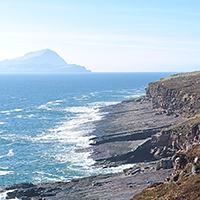 I was born and raised in a typical suburban American household outside of Los Angeles. Our community had a great sense of history and a strong agricultural tradition; once known as the navel orange capital of the world. Our downtown was full of locally-run shops; my grandmother ran a dress shop there for 30 years. My other grandparents had 20 acres of oranges...
I was born and raised in a typical suburban American household outside of Los Angeles. Our community had a great sense of history and a strong agricultural tradition; once known as the navel orange capital of the world. Our downtown was full of locally-run shops; my grandmother ran a dress shop there for 30 years. My other grandparents had 20 acres of oranges...
Then, 'progress' caught up; I saw the orange groves bulldozed to make way for thousands of cheaply-built tract houses, strip malls, and giant warehouses. To make a living, I spent on average 3 1/2 hours daily on the freeway, to and from work; 40,000 miles a year just to commute into the city. I worked in the fantasy world of Hollywood motion pictures and television, where huge money and talent was spent to create false reality.
Had you ever lived abroad before your move to Ireland?
I'd never lived abroad and I had only been across the borders to Canada and Mexico on a couple of occasions to visit; never off the continent.
What drew you to Ireland?
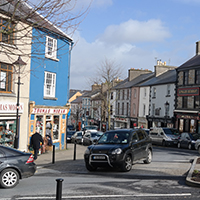 Until a dozen years ago, I knew practically nothing about Ireland, other than what St. Patrick's Day parades, Lucky Charms cereal, and Irish Spring soap commercials led me to believe. I had only a vague understanding of the political separation between Northern Ireland and the Republic; stories in the news about “the Troubles” in the 70's and 80's.
Until a dozen years ago, I knew practically nothing about Ireland, other than what St. Patrick's Day parades, Lucky Charms cereal, and Irish Spring soap commercials led me to believe. I had only a vague understanding of the political separation between Northern Ireland and the Republic; stories in the news about “the Troubles” in the 70's and 80's.
I have no Irish ancestry, but my wife had family that left the country in the 1800's, and she always wanted to visit -- so for a Christmas present one year, I bought tickets for a bus tour. It's a 24 hour trip with layovers from LA to Shannon, Ireland, so I bought a thick book on Irish history to read on the plane. By the time we were ready to land, I was enthralled by the story of the Irish nation -- the period of English colonialism, the famine time, the great migration to America; the fight for independence; the civil war.
I remember quite clearly looking out the aircraft window as we descended through the clouds, just off the coast near the Shannon estuary. Below me huge waves crashed against the shoreline; beyond that, mile upon mile of meandering stone walls, the narrow roads, dotted with cottages and farm buildings. I was transfixed!
It was the stone walls that really got to me. I thought about the men built them, stone after stone, century after century... this wasn't industrialized agriculture; this is what real people fought to create with their bare hands.
The tour itself was fun, and of course aimed at tourists, but both my wife and I felt so relaxed and so happy with the experience we booked a driving trip the following year. I fully expected the second trip, on our own, to be less pleasurable and more grounded in reality. If anything, we found we loved Ireland even more. Ireland's reality was the kind of world we wanted to exist in. It didn't take much for us to dream of living here in retirement.
Can you tell us about how your expectations have been met, exceeded or not been met by your new life in Ireland?
All in all, we made five trips to Ireland before we bought our cottage, so I think we had a good grasp on what life would be like before we got here permanently. We were most drawn to the rural west of Ireland, both because of the beauty of the countryside and the slower pace of life. We knew we'd be sharing the road with tractors, and that the weather here can be miserable, so I think we were well prepared and our expectations realistic. What we hadn't fully anticipated is the topic of your next question...
What is your favorite part of living in Ireland now that you are there?
The people; my God, the people!
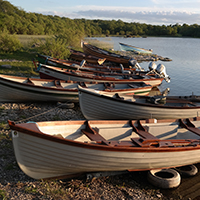 As tourists, you can pretty much anticipate that the hotel clerk or the waitress is going to be pleasant... what we couldn't grasp was just how welcoming, how articulate, how well-educated and world-aware the average Irish citizen is.
As tourists, you can pretty much anticipate that the hotel clerk or the waitress is going to be pleasant... what we couldn't grasp was just how welcoming, how articulate, how well-educated and world-aware the average Irish citizen is.
Once we moved in we were adopted by our village, invited to parties, wedding receptions, funerals, all within weeks of landing. Within 3 months, we had far more good friends than we had in the US after a lifetime. We wave as we drive down the road and they wave back. They call in for tea and share news, just as the Irish have amongst themselves for generations.
There's no strip malls or big box stores here. We know the people in the local shops, and they know us. In that regard, it's like America was in the 1930's or 40's... I feel like I'm once again part of a community that looks after one another and has everyone's best interests at heart.
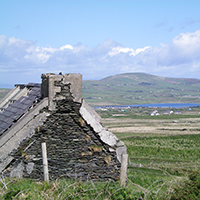 Ireland, even the most rural part of Ireland, is not some cultural backwater. My first week here, I'm standing in a muddy field talking to an old farmer who's lived here all his life. He wanted to know how I felt about a certain tactic that ISIS had recently begun using somewhere in Syria. ISIS? Syria? The lady up the road, who is still in her early 30's, has visited every continent except the Antarctic. Another woman just returned from Dubai. They all know as much, if not more about the US Presidential election than many Americans.
Ireland, even the most rural part of Ireland, is not some cultural backwater. My first week here, I'm standing in a muddy field talking to an old farmer who's lived here all his life. He wanted to know how I felt about a certain tactic that ISIS had recently begun using somewhere in Syria. ISIS? Syria? The lady up the road, who is still in her early 30's, has visited every continent except the Antarctic. Another woman just returned from Dubai. They all know as much, if not more about the US Presidential election than many Americans.
What do you do to stay busy in Ireland?
The locals, knowing I'd come from Los Angeles and being retired, thought I'd be bored, especially after I told them I neither played golf or went fishing, both popular activities here.
After a couple of months settling in, I learned from the locals that, what with Ireland's notoriously bad weather, there's no harm in not staying busy. Neighbors share books and DVDs, and drop by for a little wine on the dreariest of nights. I read, do a little photography, and some crude woodworking. Right now, I'm planning to construct a garage so I can work out of the weather.
What kind of research did you do in order to move to Ireland?
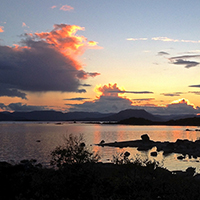 We did a LOT of research. Beyond the afore-mentioned trips, we read the Irish Times and Examiner newspapers online, daily, for several years. We kept track of Irish property for sale online, and cross referenced any houses we liked using Google Earth, a very handy tool when shopping for real estate. We of course scrutinized the Irish government's website for information on immigration, and contacted the Irish Consulate in San Francisco to follow up on what we learned... which turned out to be the beginning of our nightmare with the Irish Naturalisation and Immigration Service (INIS).
We did a LOT of research. Beyond the afore-mentioned trips, we read the Irish Times and Examiner newspapers online, daily, for several years. We kept track of Irish property for sale online, and cross referenced any houses we liked using Google Earth, a very handy tool when shopping for real estate. We of course scrutinized the Irish government's website for information on immigration, and contacted the Irish Consulate in San Francisco to follow up on what we learned... which turned out to be the beginning of our nightmare with the Irish Naturalisation and Immigration Service (INIS).
As a retiree in Ireland, what were the regulations that the Irish government felt you had violated?
Chiefly, that after we'd arrived and applied for residency, INIS created a regulation requiring anyone retiring here from a non-European Union country to provide proof of €50,000 in annual, non-investment income. That means that if you're married, and regardless if you've purchased property in Ireland or have a significant amount of money in the bank, INIS wants retirees like us to have the equivalent of $112,000 a year in perpetuity coming in from pensions. That's a ludicrous amount of money to need for living expenses; roughly four times what my wife and I actually need, and far above the average per household income of Irish citizens.
Worse, having purchased a house, a car, moved our belongings from the US and settled in to our new life, INIS, after taking 11 months to process my application, rejected us and gave my wife and I seven days to leave the country. Needless to say, we were broken-hearted and confused.
Being American retirees, we don't participate in the Irish social welfare programs or have kids in the schools. We pay for healthcare insurance; we pay VAT, car registration taxes, tax on investment income and stamp duty on property transfers. If every Euro a tourist spends generates 23 cents in tax for the Irish state, it's my bet that non-EU retirees are contributing similar amounts to government coffers. We support local businesses, buy Irish products, employ Irish folk when doing repairs on our homes. We participate in community events and donate to local charities. We cannot work so we're not taking Irish jobs.
That $112,000 a year requirement cuts out all but the richest people from coming to Ireland.
Think what Ireland is passing up here! Ten thousand people every single day retire in the US alone. Ten percent of them are of Irish heritage. Their ancestors came to America with very little, and Ireland still is not a rich land. Yet, Ireland does not want to take advantage of middle-income Americans who'd like to cash in their house and investments in the US, and come to their marvelous country!
Can you describe what you did to resolve your situation and to remain in Ireland?
I made an appeal to both my local representative in the Irish parliament and to the head of state, Enda Kenny. One or both had a discussion with the Justice Ministry which oversees INIS. We've received a visa for a one year stay. (All non-EU retirees get their status reviewed yearly.)
Was your story covered in the media? If so, please provide links if they are available online.
Yep. Pretty happy about that. The story was shared over 9,000 times [on] Irish Central: Ireland rejecting American retirees under new rules
If you could make changes to the regulations relevant to your situation as an expatriate in Ireland, what would they be?
 I recognize that Ireland must protect itself from people attempting to take advantage of their social welfare system, and the need to monitor the financial circumstances of non-EU 'permanent tourists' like we are. Were I designing Ireland's plan for people like me, I'd implement common-sense rules that welcome retirees with cash to spend in Irish businesses, and promote retirement to Ireland the same way Ireland sponsors and supports it's successful tourist industry. Citizenship after a decade shouldn't be out of the question as a thank you for investing in Ireland, and to give us the right to vote on issues that affect us, even if we're 75 or 80 years old by that point.
I recognize that Ireland must protect itself from people attempting to take advantage of their social welfare system, and the need to monitor the financial circumstances of non-EU 'permanent tourists' like we are. Were I designing Ireland's plan for people like me, I'd implement common-sense rules that welcome retirees with cash to spend in Irish businesses, and promote retirement to Ireland the same way Ireland sponsors and supports it's successful tourist industry. Citizenship after a decade shouldn't be out of the question as a thank you for investing in Ireland, and to give us the right to vote on issues that affect us, even if we're 75 or 80 years old by that point.
Knowing what you know now, what would you do differently to prepare for life as an expat in Ireland?
Only if someone had given me a crystal ball, and I was better able to take advantage of fluctuating exchange rates!
In what way is your experience with residency as an expat in Ireland relevant to ALL expats, regardless of the country in which they reside?
Come prepared to question your existing beliefs. Just because they do things a certain way back home, don't assume that's the way it should be done. Accept differences. Be open to new experiences. Learn the language, but don't adopt a fake accent. Get a neighbor to see the local sports team and have them explain the rules if you don't understand them. Smile. Don't work stories of your home country into every conversation, after all you're the curiosity; if people are interested in your opinion or perceptions as a foreign national, they'll ask. Most of all -- frequently bake goodies for the neighbors. Food is the universal language.
About the Author
 Joshua Wood, LPC joined Expat Exchange in 2000 and serves as one of its Co-Presidents. He is also one of the Founders of Digital Nomad Exchange. Prior to Expat Exchange, Joshua worked for NBC Cable (MSNBC and CNBC
Primetime). Joshua has a BA from Syracuse and a Master's in Clinical and Counseling Psychology from Fairleigh Dickinson University. Mr. Wood is also a licensed counselor and psychotherapist.
Joshua Wood, LPC joined Expat Exchange in 2000 and serves as one of its Co-Presidents. He is also one of the Founders of Digital Nomad Exchange. Prior to Expat Exchange, Joshua worked for NBC Cable (MSNBC and CNBC
Primetime). Joshua has a BA from Syracuse and a Master's in Clinical and Counseling Psychology from Fairleigh Dickinson University. Mr. Wood is also a licensed counselor and psychotherapist.
Some of Joshua's articles include Pros and Cons of Living in Portugal, 10 Best Places to Live in Ireland and Pros and Cons of Living in Uruguay. Connect with Joshua on LinkedIn.
Additional Information:
- Ireland Guide
- Healthcare & Health Insurance in Ireland
- Members Talk about Healthcare & Health Insurance in Ireland
- Best Places to Live in Ireland
- Real Estate in Ireland
- Guide to Real Estate in Ireland
- Pros & Cons of Living in Ireland
- Cost of Living in Ireland
- Culture Shock in Ireland
- Homeschooling in Ireland
- How to Enroll Your Children in School in Ireland
- Educational System in Ireland
- 2025 Guide to Living in Ireland
- Pros and Cons of Living in Ireland 2025
- 2025 Guide to Moving to Ireland
Comments
craigandmickiSmart decision to highlight this article! The observations and advice of this strong couple hold true for all of us, wherever we're going. We have faced changing requirements in Portugal, as well, especially in the last 3 years. Those of us contributing 23% of every Euro spent to these economies should be seen as a bit more valuable to the economy and international community, with some 'grandfathering' factored in to regulatory changes. Regardless, a helpful, wise and interesting article. Congratulations to the Woods!
proactivMy wife and I have been following Dave and Maura's story on the expat forum, as we would like to retire in Ireland in 4 years. Wondering what we can do at this time to assist Dave and other expats in the effort to get the current rule changed.
stgibsonExcellent article and really "so true" anywhere you go.
guestI live in Medellín Colombia and I'm amazed that the Colombian government has just imposed worldwide wealth taxes on all residents who remain here for any 183-day period out of any 365-day period. Plus an income tax, which for Americans will be a double tax. (There is not yet a double-taxation treaty between the US and Colombia.) No one is quite certain how this will shake out, but there's the rub: Uncertainty. That will give even the most daring retiree pause before transplanting his or her life to their countries. It's fair to wonder whether these countries actually want to attract (relatively) prosperous retirees, or whether we're simply a cheap and easy target for their taxation agents.
collaroygalHope you can continue to find ways to stay. We had tried to move to Australia after living and working there for 4.5 yrs. during that time they changed the rules and due to our age and no kids, we didn't have enough points when it came time to apply for perm. residency. We did return to the USA and made that work out but I miss AU every single day still.
Pebz13I am currently investigating options to retire overseas. I am looking at other countries as well. I am wondering if the minimum income is unique to Ireland, or if any other countries have implemented such a rule. Any help or reference is appreciated. Thanks!
JoshuakMy Wife and I moved to Enniscorthy Ireland for ~ one year. We did not buy a house, but found a small rental house in a retirement Village of 54 houses that were built during the "boom" times to be finished about the time the bottom fell out of the economy. The project went into Bankruptcy and the house sat there until 2013 when the Banks foreclosed and started thinking about renting again. I rented the third house in the development which was a 2 bedroom, single bath, living room and kitchen. I would say it was about 900 sq ft. Lease was one year at 500 Euro per month for everything except power. However, the big difference between me and Mr Wood is that I am an Irish citizen by birthright. I am a "dual" and my wife got residency as she was my legal spouse. If our income was 10,000 euro a year, they still had to accept me. Of course it was not, as we could afford to retain our home in US and stay in Ireland for that year. I might suggest to those reading about Ireland that what the Dail Eireann was doing was hoping to get more income tax money from "those Rich Americans". A husband and wife can have an adjusted income of about 36,000 Euro before they need to pay income tax. But at some level, the tax can be as much as 40%. That is the reason we stayed one week short of one year and besides, we filed our taxes in US and there is a agreement that income tax is only due in one country. I could write many pages about our experiences, but probably not room here. .............Jon




